Urgent plea to save 46 Aussie children stranded in Syria
There has been little sympathy for most of the inhabitants of al-Hawl refugee camp in Syria, which houses the families of suspected Islamic State fighters, but the families of the Australian children living there say it is urgent they be rescued.
News
Don't miss out on the headlines from News. Followed categories will be added to My News.
These are the faces of the Australian children desperate to be rescued amid fears they could die as winter hits their Syrian refugee camp.
The Herald Sun can reveal the names of the 46 children held in the al-Hawl camp for Islamic State fighters’ families. The youngest is a one-month-old boy, while 33 are aged under five.
Families of the “innocent” children say it is urgent they be saved. Some have rickets, others cannot speak and suffer the shakes. One girl, six-year-old Fatima, has a gunshot wound to her neck and shrapnel injuries.
“If no action is taken, it is only a matter of when, not if, a child dies,’’ said Kamalle Dabboussy, who has three grandchildren in the camp.
Mr Dabboussy — whose daughter Mariam and her three children Aisha, 3, Khaled, 3, and Fatima, 2, are at al-Hawl — said the Australian children inside the camp had done nothing wrong.
“They didn’t choose Syria, to be taken away from their friends, extended families and Australian way of life,’’ he said.
“They did not decide to miss out on schooling, to have their lives put at risk and their childhoods decimated.’’
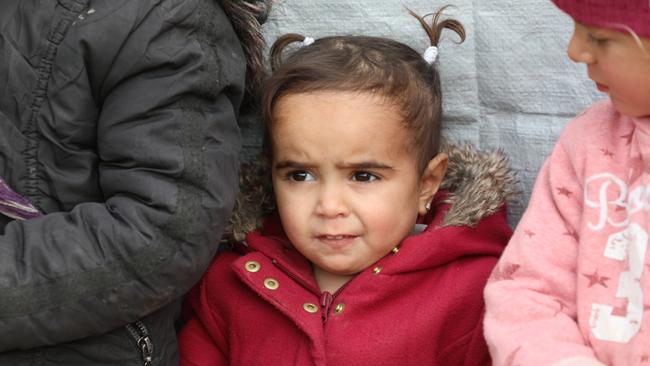
His three grandchildren have two fathers, both IS fighters killed in Syria,
There are 18 Australian boys held in the foreigner’s annex at the al-Hawl camp, along with 27 girls. Another boy, 16-year-old Yusuf, who has a mild intellectual disability, has been taken to a prison.
Save the Children’s director of international programs, Mat Tinkler, said 400 children had already died in al-Hawl and other camps in the region this year. “We have grave concerns an Australian child will add to that terrible toll if they are not brought to safety,’’ he said.
“The longer they are left in these appalling conditions, the greater their health risks, vulnerability to physical attack and susceptibility to influence by the more extremist elements in the camp.’’
He said the Syrian winter was “brutal’’ including blizzards, and the children faced risks including pneumonia, malnutrition, hypothermia and water-borne diseases.
“This is a time of year for giving, and we appeal to the generosity of all Australians to allow these children to return home to safety,’’ he said.
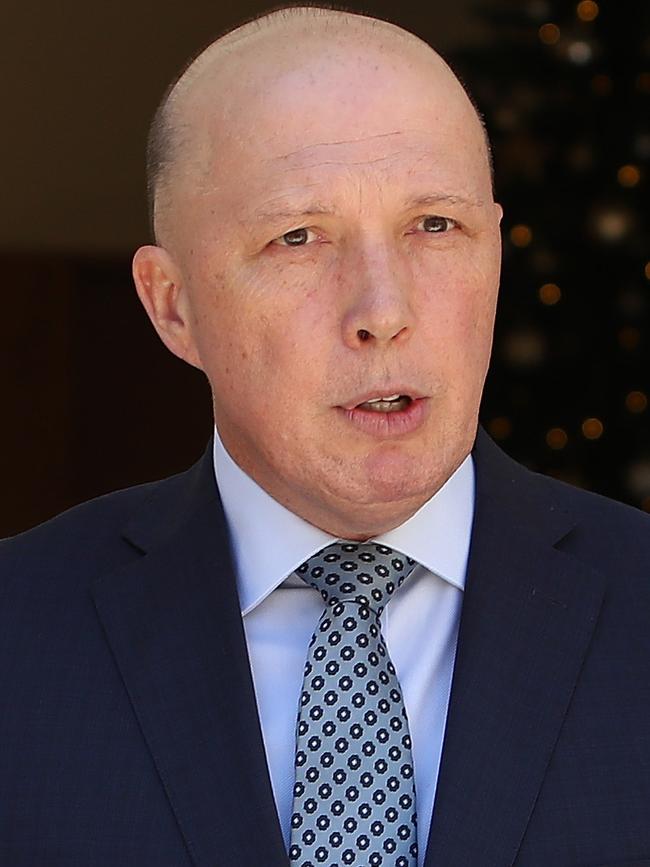
The federal government has repatriated a small group of Australian orphans from the camp, but has so far refused to allow any adults or their children home, as our intelligence agencies prepare security assessments on the 19 women in the camp and up to 20 men in jails in the Kurdish zone.
Home Affairs Minister Peter Dutton has previously said he would not place the lives of Australian officials at risk in order to repatriate the women and children, and that he had great concerns about the security threat posed by some of the women.
The minister’s spokeswoman said on Thursday he had nothing further to add.
It’s understood at least another three Australian women and three children are being held elsewhere in al-Hawl, but are not seeking repatriation.
The United States is pressuring the Australian government and other western democracies to repatriate Islamic State fighters and family members on national security grounds, and has warned the al-Hawl camp is a breeding ground for extremism.
The Americans have also offered to transport the women and children safely from al-Hawl to neighbouring Iraq, where they could undergo DNA testing to confirm their identities.
The Kurdish Syrian Democratic Forces, who are opposed to separating children from their mothers, have also offered to transport family groups to the border with Iraq.
“Regardless of the decisions of their parents, children are always innocent and they deserve our support,’’ Mr Tinkler told the Herald Sun.
“Where mothers have serious questions to answer, the only place for them to do so and be held accountable is back in Australia.’’
He said the women had offered to go beyond what was required by law and voluntarily submit to “the most stringent control orders’’. “This mitigates any security risks they may pose,’’ he said.
“The children’s families here are ready to provide the love and care they so desperately need to reintegrate into the Australian way of life.’’
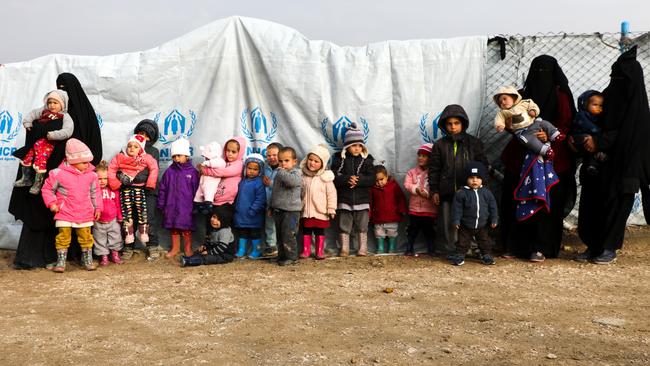
LITTLE LIVES KNOW NOTHING BUT MISERY
The Australian children living in the sprawling al-Hawl refugee camp get one hot meal a day of rice and beans, and sleep in tents providing little shelter from the rain and snow.
When the Herald Sun visited the camp this week, it was cold, wet, and the ground was covered in mud.
The children were bundled up in warm clothes and gumboots, although some wore just thongs on their feet.
Winter’s zero-degree nights are yet to arrive, but already there have been floods, which soak the mattresses and cause the tents to collapse.
It’s a miserable existence but there has been little sympathy for most of the 70,000 inhabitants of al-Hawl, which houses the families of suspected Islamic State fighters captured or killed in Syria.
The 19 Australian women there were mostly captured by, or surrendered to, US-backed Kurdish troops after the fall of Islamic State’s last pocket of territory in Baghouz in March.
Some claimed they were duped by radical husbands into travelling to Syria or were trafficked by their parents, while Australian security agencies are concerned some are radicalised and would pose a threat if they returned. Australia has evacuated a group of orphaned children from the camp.
But because of the concerns over the mothers, the 19 boys and 27 girls remain stranded in north-eastern Syria. Housed in the foreigner’s annex attached to the main camp, about 50km from the city of al-Hasakah, they have no access to school.
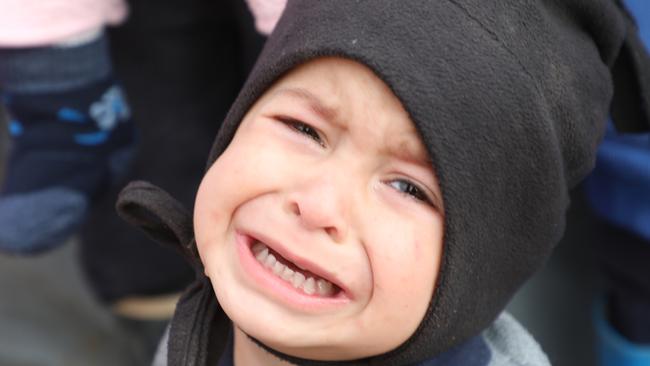
Some other women in the camp have set up informal schools, pushing Islamic State’s warped ideology.
Violence in the camp is also rife, with the strict Islamic State adherents meting out punishments including beatings and whippings.
One woman was murdered and thrown into a sewerage pit in the camp. Syrian media reports say a pregnant Indonesian woman was murdered in July after speaking to a Western journalist.
The women in the camp wear the black robes and face-covering niqabs prescribed by Islamic State, and those who have uncovered their faces — including the Australians — have been threatened.
Syria’s North Press Agency published confronting photographs in June of a 14-year-old girl who camp administrators said had been murdered by her grandmother for uncovering her face.
Concerns that the camp is becoming a breeding ground for a future generation of Islamic State terrorists has led Australia’s main security ally, the United States, to pressure the 54 countries with citizens there to take them back.
In August, the US Department of Defence reported that Islamic State was active in the camp, and “likely working to enlist members from the camp’s large population of IDPs (internally displaced persons).
“USCENTCOM (United States Central Command) said that transferring residents out of the camp — either to Syrian ‘guarantors,’ Iraqi custody or, in the case of foreign fighters, to their countries of origin — remains critical to reducing ISIS’s recruiting pool,’’ the report stated.
The children in the foreigners’ (non-Syrian) annex speak in many languages and accents. Arabic, English, Russian, Turkish, French and German were being spoken when the Herald Sun was there this week.
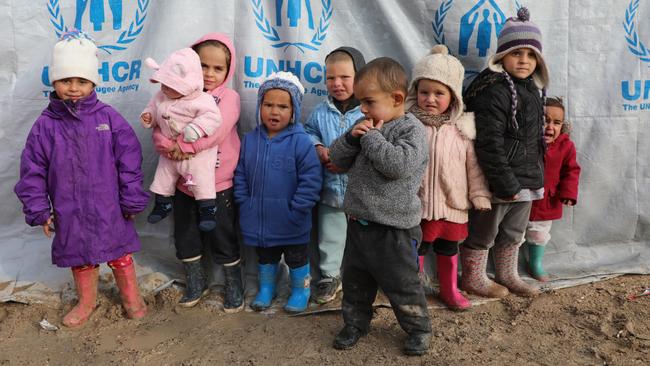
But one Australian mother reported that her three-year-old son had barely begun to form words. She believed this was due to trauma.
The camp is surrounded by wire fences, with the women and children living in white United Nations tents set up in neat rows. It is in the semi-autonomous Kurdish area of Syria, and is guarded by the Kurdish Syrian Democratic Forces, who are supported by the United States.
The October decision by US President Donald Trump to remove troops from the area, effectively allowing a Turkish incursion, also undermined the safety of the camp, with many guards leaving to fight the Turks. The remaining 400 armed guards have been attacked by women inside and had to fight off assaults by Islamic State cells on the camp’s perimeter.
Foreign women and children are rarely allowed out of their annex.
They were previously permitted to walk with armed guards to the main distribution area in the camp, but that movement has been restricted for the past four months after the guards were attacked, sometimes by women who had hidden kitchen knives and hammers in their robes.
Aid agencies provide kerosene heaters, but kerosene is sometimes delayed due to security problems, meaning the tents are often freezing, and mattresses, clothing and blankets cannot be dried. The agencies also provide hygiene kits.
The families are given a monthly ration of dry goods including lentils, rice, oil, bulgur wheat and tomato paste, supplemented by a daily ration of bread. If they have kerosene, they can cook and supplement the daily meal.
Fresh fruit and vegetables are not routinely provided by aid agencies, but are available in the camp market for those who can afford to buy them.
MORE NEWS
VICTORIA BRACES FOR RECORD HOT DAY
TRUMP: ‘YOU ARE DECLARING WAR’
SEX TOY STRANGLER ACQUITTED OF MURDER
WHAT OTHER WESTERN DEMOCRACIES ARE DOING
FINLAND Will repatriate about 30 children but has not revealed plans for 11 mothers.
BELGIUM A court last month ordered a woman and her two children be returned, a precedent case likely to open the way forothers to be returned.
UK Has taken back a small number of unaccompanied or orphaned children but is opposed to returning adults.
FRANCE Has taken back a small number of orphans and wants its citizens tried at a special court in Iraq. It has at least 400 citizens detained in Syria at camps or in prisons.
GERMANY Last month took back its first suspected Islamic State bride and her three children, following a court order.
US Is repatriating women and children on a case-by-case basis, and in some cases prosecuting the women. Strongly opposedto special courts being established in Iraq.
NETHERLANDS The government successfully appealed a court decision last month which had ordered it to repatriate 56 children. They remain in the camp.
— With Giselle Hall in Hasakah, Syria
Originally published as Urgent plea to save 46 Aussie children stranded in Syria


